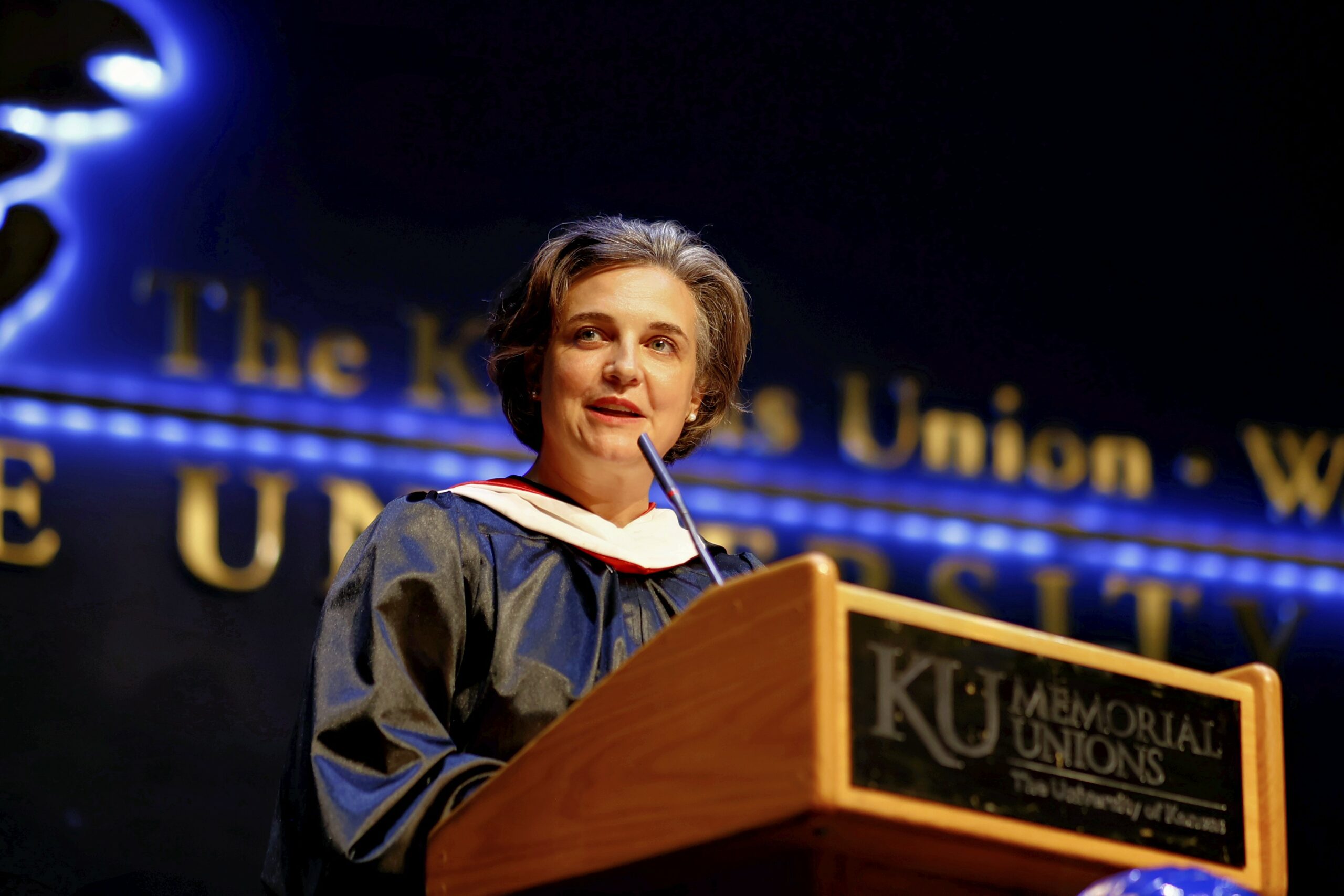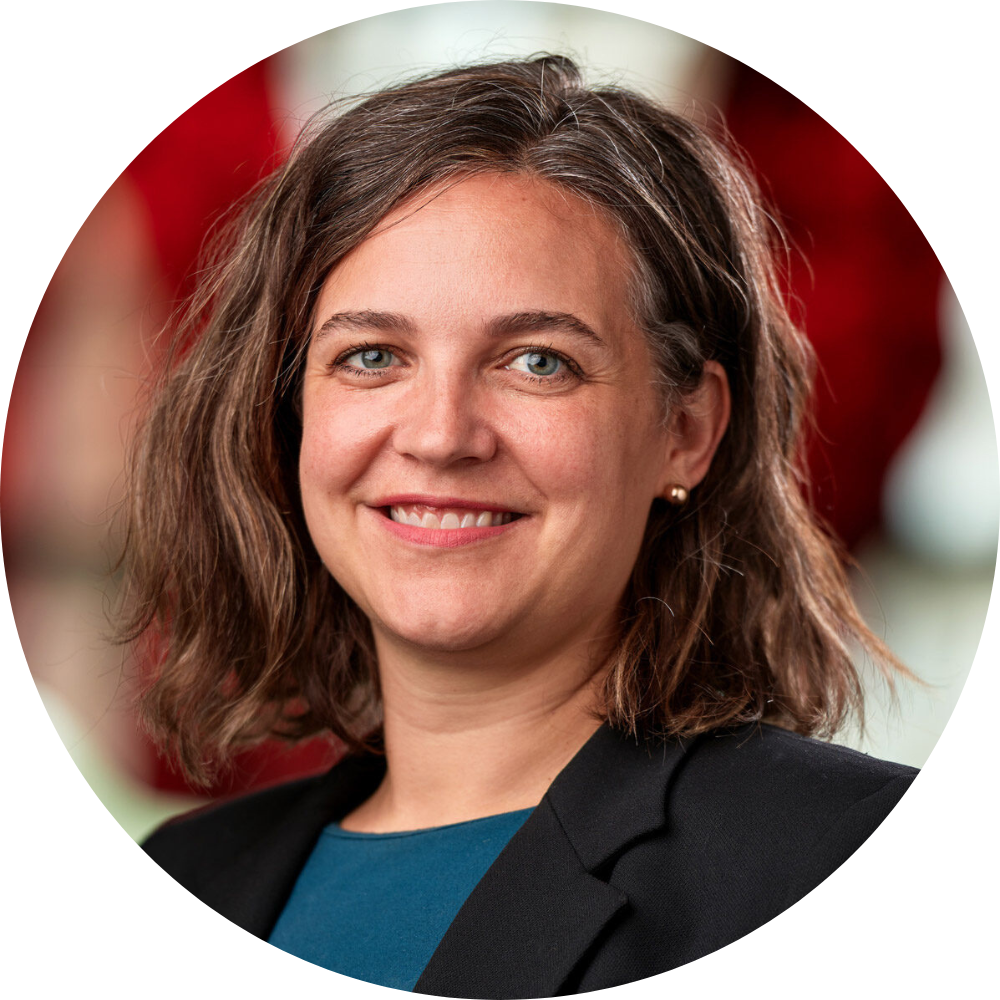You’ve Got What it Takes to Make Our Politics Better: A Message to the Class of 2024
June 3, 2024 - Features
by Audrey Coleman | Director, Dole Institute of Politics

Dole Institute Director Audrey Coleman spoke about how KU Poli-Sci’s newest graduates have the power to change the nature of our political conversations. Photo courtesy of the KU Department of Political Science.
Dole Institute Director Audrey Coleman delivered the 2024 KU Political Science Department Undergraduate Commencement Address. The following is based on remarks delivered during the KU Political Science Undergraduate Commencement Ceremony on May 10, 2024.
I’m honored to join the Political Science faculty, your family, and friends in celebrating each and every one of you as we recognize your tremendous accomplishment, earning your bachelor’s degree in political science from the University of Kansas.
I’ve had the pleasure of knowing many of you graduates in my role as Director of the Dole Institute. I can assure you that when I sat in your position 23 years ago, I certainly did not see this opportunity coming.
Looking back on my journey as a KU graduate, and the surprises and challenges my career has held, it makes me excited to learn where your next quarter century takes you.
***
In this time of celebration and reflection, I think about my journey as a student but also what, as a leader, I’m doing here at KU, at the Dole Institute, and why that matters to you all here today—students, family, friends, faculty alike—and what we can do together as we build our shared future in today’s uncertain times.
About this time last year, we at the Dole Institute were preparing to celebrate our 20th anniversary and Bob Dole’s 100th birthday. Internationally known Kansas artist Stan Herd had just broken ground on a tribute earthwork, a portrait in the ground of Senator Dole, with the help of former Senators Trent Lott and Tom Daschle—a Republican and Democrat, respectively—who extolled the bipartisan leadership of the late Senator.
Events like these, of which there are many, are exciting, but it’s connecting KU students to this caliber of leaders via programming, mentoring, and experiential opportunities that are truly the most exhilarating and are the Dole Institute’s reason for being.
Our institutional values—bipartisanship, civil discourse and civic engagement, public service, and politics as an honorable profession—are tested these days, for a variety of political, cultural, and economic reasons.
However, keeping them relevant to today’s young people and restoring these values back into our political culture is essential if we are to keep our democracy—our governance of, by, and for the people—and these non-partisan qualities must be the purview of folks across the political spectrum and generations.
Let’s face it: the politics of division and polarization have reached peak productivity. We cannot keep doing the same things, entrenching these same patterns, and expect improvement in our governance, communities, leaders, or civic lives.
Addressing this will require a true unity of purpose. The Greatest Generation, the WWII generation—Bob Dole’s generation—faced down existential crisis together. That shared effort sustained cohesion in leadership for decades thereafter.
Your parents remember the spirit of unity, patriotism, and global support Americans received after 9/11. It didn’t last. Much more recently, we had an opportunity to unite in shared humanity nationally amidst the COVID pandemic. We missed it.
Maybe, strangely, we have a new opportunity now: as we head into the 2024 presidential elections, political messaging from both parties present concerns about threats to democracy and burgeoning authoritarianism and are quick to point to evidence of these—real or imagined—from the other side.
So, let’s take them at their word and make this the unifying starting point: we recognize democracy and the US Constitution as essentials worth protecting.
In that case, it’s the nature of conversation that needs to change. And that part is much harder, absent our exposure—or willingness—to turn our collective attention to leadership that is in fact engaging in constructive dialogue across political philosophies.
The good news is each and every one of us, at the individual level, has the power to change the nature of our political conversation.
Inspired by the legacies of Senators Bob and Elizabeth Dole, here are some thoughts on how to do this, to decrease toxic division in our political culture and corrosive alienation in our civic culture, and move us toward a better, more secure, and more prosperous future for you all as new graduates. A shared future that reaps the far-reaching benefits of a political culture that values bipartisan leadership, civil discourse and civic engagement, public service, and an earnest political landscape.
Approach each day with optimism.
It’s a tall order in these times. But I’m not talking about a delusional optimism that disregards the hardness and complexity of our political or personal reality. I’m not talking about a destructive, careless optimism that lets us fiddle while Rome burns. I’m talking about a constructive, confident optimism that says: I can do this—as a thoughtful human being, I have the skills I need to build new and improbable relationships, resolve conflicts peacefully, and reconcile different points of view.
This kind of optimism is an offensive, powerful position that honors your own value and puts you in a position to identify and be receptive to the goodwill that resides in others, which is the basis of relationship building.
Find the Goodwill and “Turn Toward.”
With intention, reach across divides. Turn toward those from whom you are apparently different, not away from them. Turn toward, not in (to the echo chamber in your hand).
Start from a distance, read and engage online with a diversity of perspectives, then take a giant leap and engage socially with someone with whom you know you disagree. Ask them to coffee. Share a meal. Go to a new neighborhood or community event of which you are not currently a member, or a new part of the country. Do it once, then do it again. With repetition, strong, new relationships and mutual respect will follow.
Yes, this is potentially awkward. Yes, it takes your valuable time.
Is it worth it? Yes. And we can’t reasonably expect our leaders to take the time to do it if we ourselves don’t invest time and energy into the same activity.
Take your optimism, shared goodwill, and the folks that you’ve turned toward and show up.
You’ve heard this one time and again. Get involved. Run for office, or help others run for office. Vote and volunteer in elections administration. Even, and especially, local ones—some communities, particularly rural ones, are literally in a make-or-break situation in governance representation at city, county, school board, and elections administration. Candidates aren’t showing up. Strong local governance inoculates our home communities from the worst of outside influences.
While anyone can do this, you all, with your new B.A.s in political science, have a substantial leg up when it comes to understanding and then moving the levers of political power. For all of your ambitions directed at the far and wide, I hope your journey leads you to local leadership at some point. You have never been more needed.
These ideas are straight from the Robert and Elizabeth Dole Archives—but maybe not the ideas you were expecting, those of political wins, encounters with US presidents and foreign heads of state, and legislative victories. These are patterns of practice, bottom-up ways of engagement that, over decades of leadership and tens of thousands of pages of records, reveal not just legislative accomplishments and civic recognitions, such as Presidential Medals of Freedom, but something much more important: character of leadership.
They transcend far beyond individual legacy, and right now, the embrace of these practices alone is what constitutes accomplishment in leadership. So let’s start there. We’ve all got what it takes.
***
Class of 2024: you all have been through so much here at KU, starting with COVID and moving forward. You have been resilient in the face of extraordinary challenges, in extraordinary times.
You’re special. You hail from a land of mythical birds, chalk from Rocks, prehistoric sea dinosaurs, and a mountain rising from the flattest of surrounds—smack dab middle of the country. You’ve had extraordinary formal and informal opportunities to learn, and mentors to learn from. Keep the wonder and the wisdom of your truly unique KU perspective alive.
We are so proud of you and what you’ve accomplished. Boundless opportunity awaits you.
Congratulations Class of Two Thousand and Twenty-four. To the Stars, to endless possibility, and Rock Chalk Jayhawk.

Audrey Coleman is the Director of the Robert J. Dole Institute of Politics, where she has held leadership roles since 2012. Formerly the Archivist to Senator Bob Dole, Audrey led months-long commemorative efforts to honor Senator Dole’s 100th Birthday and the 20th Anniversary of the Dole Institute. In her role, Audrey cultivates transformative program partnerships that impact audiences and engage institutions across the region and the nation. Audrey holds graduate and undergraduate degrees from the University of Kansas, where she was a member of the Phi Beta Kappa Honors Society.
About the Dole Institute
The Robert J. Dole Institute of Politics, a vibrant forum for civil discourse, civic engagement, and idea exchange across the political spectrum, features historical archives, exhibits, and public programs for all ages. Inspired by the public service of native Kansan, veteran, legislator, and statesman Senator Bob Dole and his wife Senator Elizabeth Dole, visitor galleries feature changing exhibits, the Kansas Veterans Virtual Memory Wall, architectural-scale stained glass American flag, and September 11 memorial.
The Dole Institute is committed to universal accessibility in all programs and resources. We are in the process of making all of our web projects fully accessible. An accessible version of the material represented on this site will be made available upon request. Please contact us at doleinstitute@ku.edu to request the material be made available in an accessible format, or for general assistance.